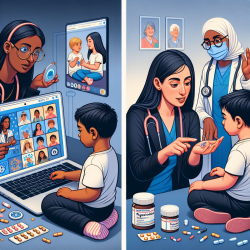Introduction
In the ever-evolving landscape of healthcare, the integration of data-driven approaches is becoming increasingly pivotal. The recent study titled "Sharing ICU Patient Data Responsibly Under the Society of Critical Care Medicine/European Society of Intensive Care Medicine Joint Data Science Collaboration: The Amsterdam University Medical Centers Database (AmsterdamUMCdb) Example" provides a compelling case for the responsible sharing of critical care data. This blog explores how the principles and outcomes of this research can be applied to enhance pediatric speech therapy practices.
The Power of Data Sharing
The AmsterdamUMCdb initiative demonstrates the feasibility of sharing complex ICU data while adhering to stringent privacy laws. This initiative sets a precedent for how data can be responsibly shared to advance scientific inquiry and improve patient outcomes. For practitioners in pediatric speech therapy, this approach offers valuable insights into how data can be leveraged to enhance therapeutic outcomes.
Implementing Data-Driven Practices in Pediatric Speech Therapy
By adopting a data-driven approach, pediatric speech therapists can gain a deeper understanding of treatment efficacy and patient progress. Here are some ways to implement data-driven practices:
- Utilize Comprehensive Databases: Just as AmsterdamUMCdb provides a rich dataset for ICU research, creating or accessing comprehensive databases for speech therapy can help track patient progress and treatment outcomes over time.
- Embrace Machine Learning: Machine learning models can analyze large datasets to identify patterns and predict outcomes, allowing therapists to tailor interventions to individual needs.
- Ensure Privacy Compliance: Following the risk-based deidentification strategy used by AmsterdamUMCdb, speech therapy data should be anonymized to protect patient privacy while maintaining data utility.
Encouraging Further Research
The AmsterdamUMCdb project highlights the importance of collaboration between institutions to share data responsibly. For pediatric speech therapy, fostering partnerships with research institutions can lead to the development of innovative treatment strategies and improved patient care.
Practitioners are encouraged to engage in further research by:
- Participating in Collaborative Studies: Join research initiatives that focus on data sharing and analysis to contribute to the broader understanding of speech therapy outcomes.
- Advocating for Data Accessibility: Support efforts to create accessible databases that can be used for research and clinical improvement.
Conclusion
The responsible sharing of ICU data as exemplified by the AmsterdamUMCdb project offers a roadmap for integrating data-driven practices in pediatric speech therapy. By embracing data sharing, machine learning, and privacy compliance, practitioners can enhance their skills and improve therapeutic outcomes for children.
To read the original research paper, please follow this link: Sharing ICU Patient Data Responsibly Under the Society of Critical Care Medicine/European Society of Intensive Care Medicine Joint Data Science Collaboration: The Amsterdam University Medical Centers Database (AmsterdamUMCdb) Example.










